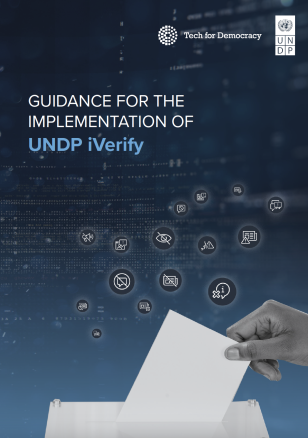Guidance for the implementation of UNDP iVerify

Guidance for the implementation of UNDP iVerify
March 21, 2023
The purpose of this document is to deliver overall strategic guiding principles and considerations for fostering information integrity and countering disinformation during elections. This document builds on the current global research in the areas of information pollution and ensuring information integrity during elections. Understanding the complexity of today’s information space presents an enormous global challenge, particularly given the abundant online information and its impact on electoral processes, in which citizens around the world exercise the right to self-determination. Many argue that misinformation, disinformation, and hate speech often pollute the information landscape, threaten peace and security, and “disproportionately affect those who are already vulnerable” (UNDP, 2022). Although it might be desirable to believe there is a framework that allows feasible comparison of country systems and their capabilities to withstand information pollution during elections, challenges, and approaches to countering it are often unique. Countries around the world do not and should not approach solving information pollution challenges the same way. First, the country’s geopolitics, its political system, size, and homogeneity highlight obvious differences. Additionally, a tradition of self-determination by citizens, a history of accountability of government to citizens at all levels, a perception of comprehensive governing laws with effective reinforcement, prior acts of contested, disputed, or annulled elections, a general level of traditional media literacy and online information literacy in society, the presence of independent media and an overall media development context – all of these factors might influence a society’s overall capability to resist information pollution. While it might seem logical to Western democracies to see certain capabilities located within a public sector or a government agency, many countries with a colonial past might have good reasons to rely on external trusted parties to build and bolster capabilities to counter disinformation (Pamment, 2022). Simply put, no single template exists for countering information pollution during elections. Rather, systems ought to be designed to be flexible and adaptable so as to cope with various vulnerabilities and threats as they arise in real time and based on the context and resources available. Hence, the following general guiding principles and considerations are offered. They are the result of reflection and feedback on previously implemented programmes designed to counter information pollution around the world.

 Locations
Locations




